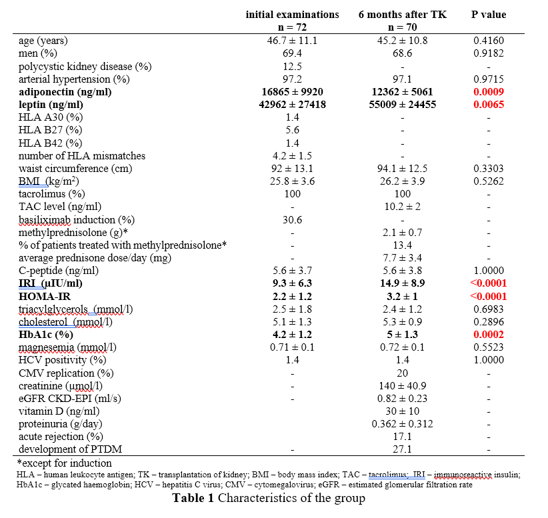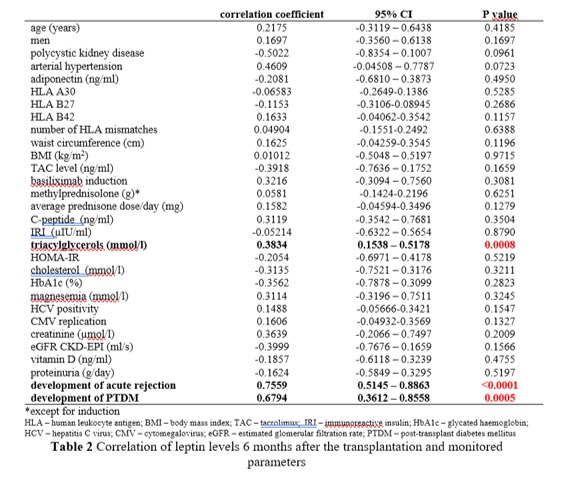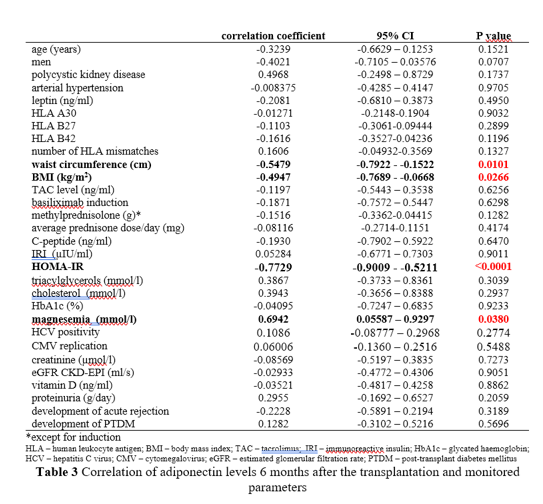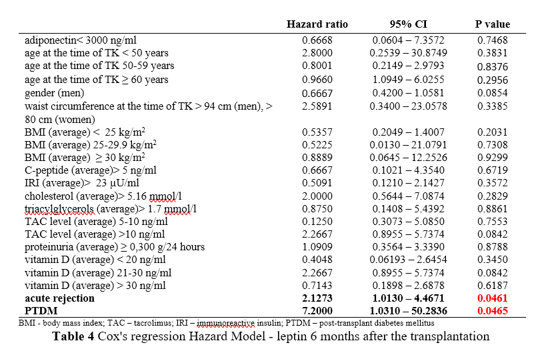Leptin – New Marker for Rejection of Kidney Transplant?
Ivana Dedinska1, Juraj Miklušica1, Ľudovít Laca1, Lea Kováčiková1, Karol Graňák1, Petra Skalová1, Peter Galajda2, Marián Mokáň2.
1Surgery clinic and Transplant center, University hospital Martin and Jessenius faculty of medicine Comenius University, Martin, Slovakia (Slovak Republic); 2Internal department I, University hospital Martin and Jessenius faculty of medicine Comenius University, Martin, Slovakia (Slovak Republic)
Obese patients have increased production of leptin and selective resistance to its central anti-adipogenic effects, yet its pro-inflammatory immunostimulating effect persists. Level of adiponectin is lower in obese patients and correlates with insulin resistance.
The aim of the analysis was to determine the impact of immunosuppression to levels of hormones in fat tissue – leptin and adiponectin.
In the group of 72 patients who underwent primary kidney transplantation (TK) in the Transplantation Centre Martin (without diabetes mellitus type 1 or type 2 at the time of TK) we examined the level of adiponectin and leptin before TK – at the time of inclusion in the waiting list and subsequently 6 months after TK. We have found that the level of adiponectin has significantly reduced (P = 0.0009), whereas the level of leptin has significantly increased in the monitored period (P = 0.0065). Adiponectin level 6 months after TK correlated with the waist circumference [r = - 0.5479; 95%CI -0.7922- -0.1522 (P = 0.0101)], body mass index (BMI) [r = -0.4847; 95%CI -0.7689- -0.0668 (P = 0.0266)] and HOMA-IR index [r = -0.7729; 95%CI -0.9009- -0.5211 (P < 0.0001)]. The level of leptin correlated with the value of triacylglycerols [r = 0.3834; 95%CI 0.1538-0.5178 (P = 0.0008)], development of post-transplant diabetes mellitus (PTDM)[r = 0.6794; 95%CI 0.6312-0.8558 (P = 0.0005)] and acute rejection (AR) [r = 0.7559; 95%CI 0.5145-0.8863 (P < 0.0001)].
We have found that the level of adiponectin has significantly reduced (P = 0.0009), whereas the level of leptin has significantly increased in the monitored period (P = 0.0065). Adiponectin level 6 months after TK correlated with the waist circumference [r = - 0.5479; 95%CI -0.7922- -0.1522 (P = 0.0101)], body mass index (BMI) [r = -0.4847; 95%CI -0.7689- -0.0668 (P = 0.0266)] and HOMA-IR index [r = -0.7729; 95%CI -0.9009- -0.5211 (P < 0.0001)]. The level of leptin correlated with the value of triacylglycerols [r = 0.3834; 95%CI 0.1538-0.5178 (P = 0.0008)], development of post-transplant diabetes mellitus (PTDM)[r = 0.6794; 95%CI 0.6312-0.8558 (P = 0.0005)] and acute rejection (AR) [r = 0.7559; 95%CI 0.5145-0.8863 (P < 0.0001)]. 
 Applying the multivariate analysis we found out that high level of leptin is a risk factor for the development of AR [HR 2.1273; 95%CI 1.0130-4.4671 (P = 0.0461)] and PTDM [HR 7.200; 95%CI 1.0310-50.2836 (P = 0.0465)]. On the contrary, low levels of adiponectin represent a risk factor for the development of insulin resistance [HR 38.6135; 95%CI 13.3844-67.7699 (P <0.0001)] and obesity (BMI more than 30 kg/m2) [HR 3.0821; 95%CI 0.8700-10.9192 (P = 0.0053)].
Applying the multivariate analysis we found out that high level of leptin is a risk factor for the development of AR [HR 2.1273; 95%CI 1.0130-4.4671 (P = 0.0461)] and PTDM [HR 7.200; 95%CI 1.0310-50.2836 (P = 0.0465)]. On the contrary, low levels of adiponectin represent a risk factor for the development of insulin resistance [HR 38.6135; 95%CI 13.3844-67.7699 (P <0.0001)] and obesity (BMI more than 30 kg/m2) [HR 3.0821; 95%CI 0.8700-10.9192 (P = 0.0053)].
We did not observe effect of immunosuppression on concentrations of monitored hormones in the serum in our analysis. However, we found that high concentration of leptin in serum constitutes an independent risk factor for the development of acute rejection and requires further monitoring.
